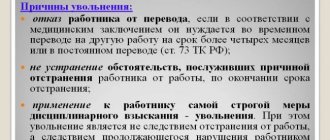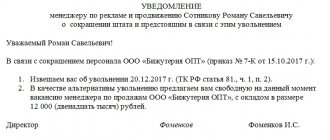The process of voluntary dismissal is the termination of an employment contract at the initiative of the employee. Most companies are loyal to an employee’s desire to change jobs, but even the voluntary dismissal process has its own nuances.
Since labor relations are regulated by the Labor Code of the Russian Federation, it is necessary to follow a number of rules in order to avoid troubles.
The general procedure for voluntary dismissal for an employer:
- receive an application
- hand over to the manager for signature,
- assign work to the due date,
- issue a dismissal order,
- make an entry in the work book,
- issue all required documents.
- The resignation letter must include:
- intention to resign on his own initiative,
- planned date of termination of the employment contract,
- date and signature of the applicant.
The employee prepares and submits the application independently. Please note that reasons for dismissal do not need to be specified. The employer then needs to register the application upon receipt.
After receiving the application from the employee, the question of working out arises.
However, the question of whether the employee will work the mandatory two weeks remains open. Let's turn to Article 80 of the Labor Code of the Russian Federation and explain the situation.
The article states that an employee must give notice of his resignation at least 14 days in advance. However, there is not a word about working off. This is due to the fact that not all employees have to work. The employee notifies the employer of his resignation two weeks in advance, and then the director decides whether there will be work off and how much.
But the requirement for prior notification is quite justified, since during this time the employer will be able to find a replacement.
The category of citizens who do not need to work 2 weeks include::
- pregnant women and mothers with young children,
- parents of disabled children,
- applicants who are starting their studies,
- specialists who have reached retirement age,
- people drafted into the army or forced to move to another city.
also the category of employees for whom a three-day work period is established:
- During a probationary period (it is enough to inform management about leaving in time, and you will not have to work longer than this period);
- If a fixed-term contract is concluded, which is terminated at the initiative of the employer, 3 days is the period within which the manager must notify the person of termination of the contract.
- For seasonal work or if the contract period is less than two months.
For the head of the company, the application period has been increased to 1 month.
The day of commencement of work is considered to be the day following the submission of the application. If an employee sends an application by mail, he needs to know on what day management received his application, and from the next day
Determining the date of dismissal
The procedure for terminating an employment contract begins if:
- the employee wrote a statement of his own free will;
- the employer issued an order to reduce staff;
- the employer decided to dismiss the employee for disciplinary misconduct or due to loss of trust;
- the employee and the management of the organization entered into an agreement to terminate the employment relationship.
But the reason for termination of the employment contract and the primary document do not play a role. By virtue of Article 84 of the Labor Code of the Russian Federation, the date of dismissal is considered the last working day in the organization. The only exceptions to the norms of this article are those situations in which the dismissed person was absent from work: he was sick or was on vacation, but his job was retained. However, formally in this case too, answer the question “will the day of dismissal be considered a working day or not?” Possibly positive.
The only difficulty is to correctly indicate in the documents that the day of the employee’s dismissal is a certain date.
Document submission deadlines
A completed sample application for voluntary resignation for individual entrepreneurs and individuals may be sent to management at any time, including during the period:
- work;
- being on vacation;
- illnesses, etc.
In different situations, there are different notice periods for the upcoming termination of the relationship:
- The application must be submitted 14 days in advance, regardless of the type of employment contract (fixed-term or indefinite). The employer has two weeks to find a new employee;
- notify 3 days in advance if the work is seasonal or the test period has not yet ended;
- for 1 month, if the person is a top manager (deputy general director or general director himself).
Let's summarize the submission deadlines in the table:
| Conditions | Deadline for submission |
| Probation | In 3 days (part 4 of article 71 of the Labor Code) |
| Seasonal work up to 2 months | In 3 days (Part 1 of Article 296 of the Labor Code) |
| Director's departure | For 1 month (Article 280 of the Labor Code) |
| Dismissal of an athlete or coach under an employment contract for a period of more than 4 months | For 1 month (Part 1 of Article 348.12 of the Labor Code) |
| Other cases | In 2 weeks (Part 1 of Article 80 of the Labor Code) |
IMPORTANT!
If, after the employee has written the text of the resignation letter, he falls ill, then the 14-day period (popularly called work off) is not extended. The employee is fired on the day recorded in the submitted document.
Work and payment on the last day
Since the day of dismissal of an employee is considered a working day, except in certain cases, he must be at work and perform his official duties as usual (if he is not on vacation). Management is obliged to pay all payments due to the employee, which include:
- salary for hours worked;
- vacation pay and compensation for unspent vacation from previous periods;
- severance pay (if provided);
- other compensation payments.
Also, the person must be given a work book, in which the corresponding entry must be made.
Next, we will look at several specific cases and determine for them which day is considered the day of dismissal.
What is the best date to terminate the contract?
Before counting the date of dismissal, it is necessary to clarify several points:
- vacation period (if an employee took his vacation “in advance,” then not only will he not be paid compensation, but he will also remain in debt to the organization for unearned vacation money);
- the opportunity to get a new job immediately or shortly after dismissal.
You should not indicate a non-working day as the day of dismissal. The law does not prohibit it, but confusion often arises with such dismissal , because by dismissing an employee earlier, the employer will deprive him of the right to withdraw his application on the last day, and by dismissing him later, he will be deprived of the opportunity to start a new job on Monday.
Thus, what date is best to quit a job is a personal matter and an employee’s right protected by law. Direct determination of the exact date will depend on several legally significant facts, in particular, on the date of filing the resignation letter (if we are talking about voluntary dismissal).
Standard cases and terms of termination of the contract
Application at your own request
If an employee decides to resign on his own, then by law he is required to notify management about this two weeks (14 calendar days) in advance. In addition, the application for termination of the contract itself usually indicates the day of dismissal. However, employees often have doubts whether the day of dismissal is considered a working day or not. The Labor Code specifies: the last working day is considered to be exactly the date that falls on the last day of such warning.
By virtue of Article 14 of the Labor Code of the Russian Federation, the warning period should begin to count the next day after submitting an application to the company’s personnel service. If, for example, an employee wrote a statement and submitted it to his superiors on December 1, then he must indicate December 15 in it. This will be his last day at work. It is important to clarify that in the application you need to avoid the preposition “with”: you need to write not “I ask you to fire me on December 15,” but simply “to fire you on December 15.” This will make it easier for the personnel officer to navigate when drawing up an order, and the inspectors will not have any unnecessary questions. In addition, this wording serves as protection against discrepancies in the understanding of what day the last working day falls on in the course of possible disputes between employees and employers.
Agreement of the parties
If the parties decide to terminate the employment contract by mutual consent, they also draw up a separate document about this. In this situation, there may be no two-week working period, and any day convenient for both parties for completing professional duties and terminating the employment contract can be chosen. This is what should be indicated in all documents.
Features of working off upon dismissal
Upon dismissal, an employee leaving the company is legally required to work a certain number of days. The duration of work can vary from three to fourteen days; some categories of citizens have the right to leave the company in one day without working at all. Those who will have to interact with the employer for some time after the application are very interested in the following questions:
- what day does the work start?
- can working hours include weekends and holidays;
- Is it possible to quit without working in principle;
- how to correctly determine the last working day.
We will answer each of the questions in turn.
The days of service are counted from the day following the submission (registration) of the resignation letter. The law does not say that the employee must work during the working days; thus, working days may include days off and holidays, days of paid or unpaid vacation and sick leave days. Certain categories of citizens have the right to resign without service, namely:
- persons of retirement age;
- women expecting a child;
- mothers and other persons who are adoptive parents of one or more children under the age of 14 years.
In addition, citizens who do not belong to the above categories also have the legal right to leave the company at any day. They can do this when specific life circumstances occur:
- admission to study at a higher education institution or other educational institution for a bachelor's or master's degree in a full-time education department;
- the arrival of the appropriate age (55 years for women and 60 years for men) and the employee’s retirement;
- violation by an employee of the rules of the Labor Code or the provisions of local labor or collective contracts;
- moving to another area to a new place of residence for the purpose of employment or for medical reasons;
- emigration of a spouse for employment abroad;
- obligations to provide care for a family member in a state of incapacity, a child in a state of disability, or a child whose age does not exceed 14 years.
If the employee does not belong to any of the listed categories, but he has a very strong desire to part with the company as soon as possible, you can try to negotiate with management directly. In some cases, the parties find the possibility of a compromise, and the desire to leave the company without working at all turns out to be feasible.
The author’s personal practice shows how you can use to your advantage the provisions of the Labor Code, according to which the working period includes weekends and holidays. The author of these lines once had to submit a letter of resignation from the company on the eve of the long New Year and Christmas holidays. The application was submitted on December 28, due to which almost the entire period of fourteen-day work fell on weekends and holidays. This simple method can help reduce the amount of work required upon dismissal, because the law does not require a citizen to work directly on the days of service. In the case where the work is only three days, by selecting the date for submitting the application in a certain way (for example, before the May holidays), you can ensure that all the work will take place on weekends, after which you can safely come to the company for payment and payment due documents. Of course, the employer may not like this very much, but in such a situation everyone is free to set priorities on their own.
Determining the last working day is very simple. It is enough to count the days of work, starting from the day following the day of filing the application. The last day of work will be the last working day in the company, as well as the day of dismissal.
In most cases, employees of the enterprise’s personnel department are able to answer any questions regarding the dismissal procedure. They are interested in ensuring that the dismissal is completed correctly, so they readily provide application templates and advise on the intricacies of the process.
Video: is it necessary to work for two weeks when leaving the company?
If the day of termination of the employment contract falls on a weekend
It happens that the date indicated in the application, on which the end of the two-week warning period falls, falls on a weekend or non-working holiday. In this case, the norm of Article 14 of the Labor Code of the Russian Federation applies: a person can finish work only on the next day following a weekend or holiday. This is the position of Rostrud, but there is another position, according to which it is possible to issue calculations and documents the day before.
However, this rule does not apply to shift work, when the employee was scheduled to work at this time. In this case, as Rostrud indicated in letter No. 863-6-1 dated June 18, 2012, the person must be settled on the agreed day without any transfer of deadlines. However, a problem may arise here: the resigning employee’s shift may fall on a Saturday or Sunday, when the accounting department and personnel are on vacation. Then the employer will have to call the accountant and personnel officer to work on their day off and subsequently compensate for such an exit, as required by the Labor Code.
In what cases can an employee request dismissal without waiting two weeks?
The law clearly indicates the reasons when an employer is obliged to sign a letter of resignation and release an employee without two weeks of “working off” on the very day that the person resigning indicates in his application:
- enrollment in a university, vocational school or other educational institutions;
- the onset of retirement;
- transfer of the employee's wife/husband to other regions and states;
- conscription for compulsory military service;
- if this right is specified in an employment or collective agreement or an additional agreement;
- other circumstances specified in the Labor Code of the Russian Federation.
All of the above points must have an evidence base.
The absence of an employee from the workplace after writing a letter of resignation without important grounds before the passage of a two-week period can quite legitimately lead to dismissal for absenteeism. This information can be entered into his work book and personal card.
Before the employee works his last day, the personnel officer or the head of the company must give him a work book, originals and copies (upon request) of other documents and make a final settlement with him. It is better not to violate this rule, since otherwise questions may arise from government supervisory services.
Dismissal during vacation or sick leave
Dismissal at the initiative of the employer while the employee is on vacation or sick leave is prohibited. If he wrote a statement of his own free will, there are no legislative obstacles.
The norms of Article 84 of the Labor Code of the Russian Federation provide that if an employee was absent during the termination of relations with the employer for a good reason - for example, he was on vacation - then the last working day is determined differently:
- If this date falls on the day when the person fell ill and received a certificate of temporary incapacity for work, and he was fired at the initiative of the employer, this will be the nearest weekday after leaving sick leave. By the way, this is a comprehensive answer to the question: can someone be fired on sick leave? They can’t do it while on sick leave, but immediately after it closes, please. If the employee wrote an application to terminate the contract at his own request or by agreement of the parties, during the termination of the employment relationship he may also be on sick leave.
- If an employee received leave with subsequent dismissal, then the day of dismissal of the employee is the final day of his leave.
Question No. 2
Under what conditions can an employee resign before the end of two weeks?
If there is mutual agreement between the parties to the employment contract, it can be terminated before the expiration of the notice period for dismissal ( Part 2 of Article 80 of the Labor Code of the Russian Federation).
Part 3 of Art. 80 of the Labor Code of the Russian Federation provides that the employer is obliged to terminate the employment contract within the period specified in the employee’s application for dismissal on his initiative (at his own request), in cases where such a statement is due to the following circumstances:
- the employee does not have the opportunity to continue working (for example, due to enrollment in an educational organization, retirement, or for other valid reasons due to which the employee cannot continue working, for example, due to a change of residence, sending a husband (wife) to work abroad, to a new duty station);
— a violation by the employer of labor legislation and other regulatory legal acts containing labor law norms, local regulations, the terms of a collective agreement, agreement or employment contract has been established. It must be borne in mind that these violations can be established, in particular, by bodies exercising state supervision and control over compliance with labor legislation, trade unions, labor dispute commissions, and courts.
Thus, if an employee intends to resign without working out the specified period, early termination of the employment contract is possible only with the consent of the employer, and in cases of impossibility of continuing work, including other existing circumstances, provided for in Part 3 of Art. 80 of the Labor Code of the Russian Federation, the employee only needs to contact the employer with a corresponding application.
Payment and work record
According to Art. 84.1 of the Labor Code of the Russian Federation, on the day of dismissal, the employee must be given:
- settlement amounts;
- work book.
In addition, upon his application, documents related to work are issued: a copy of the dismissal order, a certificate of earnings for 2 years, a 2-NDFL certificate, information about contributions to the pension fund.
As a rule, the following are included in the calculation of dismissal pay:
- salary in proportion to the time worked per month;
- bonus (if mentioned in the collective agreement, as a rule, also in proportion to the period worked per month);
- severance pay (in case of layoffs and liquidation - mandatory, in other cases - according to the Labor Law);
- compensation for vacation if vacation was not used before dismissal.
The work book is handed over in person, with a confirming signature upon receipt. If an employee is absent on the day of dismissal or refuses to receive a document, it is necessary to send him a corresponding notice. It is best to obtain the employee’s written consent in advance to send the work book by mail. In case of non-receipt in person, such actions release the administration from liability for the delay of the document.
If the document remains unreceived, it can be issued within 3 days to the employee upon his application.
Results and conclusions
- The day of dismissal is generally considered a working day, with the exception of situations in which the employee retains his place, but is absent from service. This day must be worked and paid. The day of dismissal is not considered a working day if the employee wrote a statement in advance with the intention of resigning and fell ill or went on vacation. The day of dismissal is not considered a working day if the employee missed it and was fired for violation of discipline.
- If a citizen believes that his rights have been violated, he can contact the employer himself, then the labor inspectorate, the prosecutor’s office and the court for justice.
- The work book is issued in person on the day of dismissal or sent by mail to the employee who did not receive it. An unreceived document is issued to a citizen upon written application within three days.
Where can a fired employee complain?
If an employee believes that he was fired illegally, and in some cases simply to cause trouble for his former employer, he has the right to appeal to the labor inspectorate, the prosecutor's office or the court.
The labor inspectorate may limit itself to requesting documents on a dismissed employee, or it may conduct an unscheduled inspection of the employer, and then all personnel documents will be checked. If the personnel documentation is kept in order, and the documents on the dismissal of the employee who caused the inspection clearly prove that the employer is right, then there is nothing terrible for him in such an inspection. If the labor inspectorate recognizes that the employee was dismissed illegally, it will issue an order to reinstate the employee. Disagreement with the order will have to be challenged in court, and for violating the terms of reinstatement at work, a fine may be imposed under Art. 19.5 of the Code of Administrative Offenses of the Russian Federation (up to 20 thousand rubles per organization and up to 2 thousand rubles per official).
A complaint from a dismissed employee to the prosecutor’s office most often results in the same labor inspectorate dealing with the issue, but the prosecutor’s employees themselves can appear to the employer without warning. They cannot issue an order to reinstate the employee, but they are obliged to transfer the case of violation of his rights to the court (if such facts have been discovered).
An employee can go to court on his own, or documents on his case can be filed by the labor inspectorate (or the prosecutor's office). If the court sides with the employee, the employer must:
- issue an order canceling the previous dismissal order;
- reinstate the employee to his previous workplace;
- cancel the dismissal entry in the work book or issue a duplicate work book without this entry;
- pay the employee wages during forced absence;
- pay compensation for moral damage if specified in the court decision.
Of course, one can hardly expect normal labor relations after the employee is reinstated at work through the courts, so it is in the employer’s interests to comply with all norms and deadlines for dismissal for various reasons.





